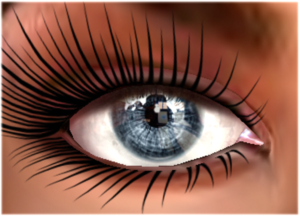
Along with living with humans, I share my life with one horse, two cats and three chickens. There is rather a nice symmetry there but what’s a Fibonacci among friends. I find myself talking to all the living brings in my life as if they see what I see and think the same things. Now I know that when I walk to the chicken coop and sing out, “Good morning, chickens. How are you guys today?” that I”m going to hear “Cluck, cluck, cluck” in reply and that I really have no idea if that is a response to my greeting and if it is what it might mean. Yet, I persist in talking to them.
When I walk up to my horse in the morning, he sometimes just stares at me. Or, if my assumption of staring is totally wrong, he is making no response to my presence. Other times, he will make a nickering sound that horse researchers have concluded is a friendly greeting. Or a third option is he will walk over to me and let me rub his ears. I interpret each variation of our encounters in human terms. I feel a bit miffed if he just “stares” at me and happy if he nickers. Then, I remind myself that I really have no idea that’s going on in his mind.
I have always been intrigued by perception. As a senior, undergraduate, experimental psychology major, my colleague and I conducted a study about how freshmen psych 101 volunteers perceived the way after-images faded after a simple shape was imprinted on their retinas by a powerful flash. No human subjects protections then. But that is another question.
 Perception has two parts. Our senses and what they allow us to sense. Our brain and what conclusions we draw from what we sense. I briefly perused the Internet for articles about what people and various other animals sense (see references). I concluded from this that in some ways we and them see, smell and hear some things the same and some things differently. To me at least, this mixture of similar and different sensing abilities boils down to: different species sense differently. A cat will often suddenly look at the window and then run over to it and paw at the window. I assume he sees something interesting moving out there but I can see nothing.
Perception has two parts. Our senses and what they allow us to sense. Our brain and what conclusions we draw from what we sense. I briefly perused the Internet for articles about what people and various other animals sense (see references). I concluded from this that in some ways we and them see, smell and hear some things the same and some things differently. To me at least, this mixture of similar and different sensing abilities boils down to: different species sense differently. A cat will often suddenly look at the window and then run over to it and paw at the window. I assume he sees something interesting moving out there but I can see nothing.
Finally, humans can tell other humans what they are thinking due to the use of spoken and written language. Neither my cats nor my horse can tell me, in a clearly unambiguous way, what they are sensing. Nor can they tell me what they are concluding about what they sense. I can infer from sounds they make what they might be sensing or thinking. That still has components of assumption.
Yet, I do have a bond with both the cats and the horse. Not so much with the chickens. I have taught both cats and horse to do certain things on command. They appear to enjoy being scratched in various places. And so on. I’m going to continue to talk to them as if they understand. Research has shown that horses especially and cats not so much, do respond appropriately to the emotions we exhibit while we are assuming that the actual words we use are being understood. I’ll just remind myself on occasion that I’m making assumptions that truly are erroneous.
John Lubbock, expressed the thought that the worlds of animals “may be full of music which we cannot hear, of color which we cannot see, of sensations which we cannot conceive.” Boy Howdy. I agree with that.
References
- Songs suggested by the title and having nothing to do with perception:
- Do you see what I see?, Hunters and Collectors, YouTube.
- Do you hear what I hear?, Bing Crosby, YouTube.
- Why Do Horses Nicker?, Nancy Diehl, The Horse, 2020.
- The Doors of Animal Perception, Lars Chittka, American Scientist, Jan-Feb 2023.
- An Immense World: How Animal Senses Reveal the Hidden Realms around Us, Ed Yong, Random House, 2022.
- On the Senses, Instincts, and Intelligence of Animals, John Lubbock, 1888.
- The Top 8 Animals That Can See Infrared, AZ Animals, 2022.
- The Human Eye Can See Infrared Light, Plus 5 Other Things You Had No Idea Eyes Can Do, Insight, 2015.
- How Do You Know If an Animal Can See Color?, Ask a Biologist, Arizona State University.
- In Some Ways, Your Sense of Smell Is Actually Better Than a Dog’s, Brian Handwerk, Smithsonian Magazine, 2017.
- Hearing Capabilities of Animals — Can They Really Hear Better than Humans?, Pure Sound Hearing, 2017.
- Yes, dogs can ‘catch’ their owners’ emotions, Stacey Colino, National Geographic, 2021.
- Research shows that horses recognize and react to human emotions expressed by facial cues alone, Mick McCluskey, Equus, 2022.
 |
| Visits: 5 |
